

This page is intended for UK patients who have been prescribed iptacopan for paroxysmal nocturnal haemoglobinuria.
The information on this website does not replace the patient information leaflet which comes with your medication. Please always refer to your patient information leaflet for more information. If you have any questions, ask your doctor or care team. Connected – Stronger Together is a patient support programme organised and funded by Novartis.
Why were you prescribed iptacopan?
Iptacopan is a medication used to treat paroxysmal nocturnal haemoglobinuria (PNH) in adults who have haemolytic anaemia (low levels of red blood cells) due to the breakdown of their red blood cells.1
You’ve been prescribed this treatment to help manage your condition. This may be your first treatment prescribed specifically for PNH, or you may have been on other treatments for PNH.
Switching from another PNH treatment to help manage your condition
If you are switching from a different PNH treatment to iptacopan, you may be at risk of haemolysis (the breakdown of red blood cells). It’s important that you start your new treatment with iptacopan at the right time to minimise this risk.1 Your healthcare team will provide you with all the information you need if you are switching from another treatment. If you have any questions throughout the switching process, contact your healthcare team.
Recommended dose for iptacopan: take one 200 mg capsule by mouth with a glass of water twice a day (once in the morning and once in the evening), with or without food.1
Taking medication by infusion vs by oral capsule
Some people might assume medicines given by infusion work better than medicines taken as a pill, tablet or capsule by mouth. In fact, how effective a medicine is depends on what substances are in it, rather than how it’s administered. Some medicines can only be given by infusion because the acid in your stomach would break them down if they were taken by mouth.2
If you have further questions about taking medication by mouth instead of as an infusion, you may wish to talk about it with your healthcare team.
Getting started with iptacopan
Always take this medicine exactly as your doctor or pharmacist has told you. Check with your doctor or pharmacist if you are not sure. Do not exceed the prescribed dose.1
Before starting iptacopan
Do not take iptacopan:1
if you are allergic to iptacopan or any of the other ingredients of this medicine (listed in section 6 of your patient information leaflet).
if you have not been vaccinated against Neisseria meningitidis and Streptococcus pneumoniae, unless your doctor decides that urgent treatment with iptacopan is needed.
if you have an infection caused by a type of bacteria called encapsulated bacteria, including Neisseria meningitidis, Streptococcus pneumoniae or Haemophilus influenzae type B, before starting iptacopan treatment.
Dosing instructions
The recommended dose for iptacopan is one 200 mg capsule taken twice a day by mouth with a glass of water, once in the morning and once in the evening. Iptacopan can be taken with or without food.1
It’s important to take your medication as prescribed by your healthcare team so that it can work continuously to help improve symptoms of anaemia. Missing doses will reduce your protection against these potential problems.1
To reduce the chance of missing doses, it’s helpful to have a routine that is tied to something you already do regularly, such as brushing your teeth.
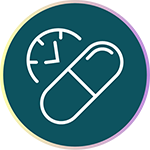
If not advised otherwise by your treating healthcare team, you should take iptacopan by mouth, two times a day. Swallow iptacopan with a glass of water.1

It can be taken with or without food.1

You may find it easier to remember to take your doses when you wake up in the morning and at night before you go to bed.1
If you miss a dose
If you miss a dose or doses of iptacopan, it’s important that you take one dose as soon as possible, even if it’s shortly before your next dose is due. You can then take your next dose with your regular dosing schedule.1
If you miss several doses in a row, contact your healthcare team, who may decide to monitor you for any signs of the breakdown of red blood cells.1
Stopping your treatment with iptacopan can make your condition worse. Do not stop taking iptacopan without talking to your doctor first.1
What to do if you vomit
Vomiting could be a sign that you have a serious infection, and your healthcare team will need to treat it quickly.
If you experience vomiting when taking iptacopan, you should call your healthcare team immediately.1

Patient and caregiver treatment guide
Please see the side effects section on this web page for other signs of serious infections.
How to store iptacopan
Iptacopan does not require any special storage conditions. Keep this medicine out of the sight and reach of children.1 Do not use iptacopan after the expiry date, which is stated on the carton after ‘EXP’. The expiry date refers to the last day of that month.1
Do not throw away any medicines via wastewater or household waste. Ask your pharmacist how to dispose of medicines you no longer use. These measures will help protect the environment.1
Can you take iptacopan if you’re pregnant?
If you’re pregnant or breastfeeding, or think you may be pregnant or are planning to have a baby, ask your healthcare team for advice before taking iptacopan. You should also tell your healthcare team if you become pregnant during treatment with iptacopan. They will discuss with you the potential risks of taking it during pregnancy or breastfeeding.1
Your healthcare team will decide whether you should stop breastfeeding or stop iptacopan treatment, taking into account the benefit of breastfeeding for your baby and the benefit of treatment for yourself.
It is unknown whether iptacopan passes into human milk and may affect the breastfed newborn/infant.
Your healthcare team will decide whether you should take iptacopan while you are pregnant only after a careful risk–benefit assessment.
How does iptacopan work?
Iptacopan targets a protein called Factor B, which is involved in a part of the body’s immune system called the ‘complement system’. To understand how it works, it's helpful to know what happens in your body with PNH, and the role of the complement immune system.1
Your immune system helps to fight off disease and infection in your body. The complement system is a group of more than 40 proteins that forms part of your immune system. A key part of the complement system is Factor B, which circulates in your blood and helps the immune system to fight off infections.4
In patients with PNH, the complement system is overactive, causing the destruction and breakdown of the red blood cells, which can lead to anaemia, tiredness, difficulty in functioning, pain, pain in the stomach (abdomen), dark urine, shortness of breath, difficulty swallowing, impotence and blood clots.1,5,6
By attaching to and blocking the Factor B protein, iptacopan can help to stop the complement system from attacking the red blood cells. This medicine has been shown to increase the number of red blood cells and thus may improve symptoms of anaemia.1,7
Understanding iptacopan in three steps1,7
Understanding how iptacopan can help reduce anaemia
As PNH causes the breakdown of red blood cells (haemolysis), leading to anaemia, you can see why it’s important to take iptacopan so that it can improve your haemoglobin levels.5,7–9
How to keep the risk of haemolysis low
Because of the constant threat of haemolysis from complement system attack, to control your symptoms it is very important to take your treatment as your healthcare team has prescribed. Do not stop taking iptacopan or change the dose without speaking to your healthcare team first.1
Always speak to your healthcare team if you have any concerns about PNH or your treatment with iptacopan.

Patient and caregiver treatment guide
Possible side effects
As with all medicines, side effects can occur. Although not everyone experiences them, there is a chance that you may experience some unwanted side effects while taking your treatment.
Serious side effects
The most commonly reported serious side effect is urinary tract infection.1
If you experience any of the symptoms of serious infection listed in the ‘Warnings and Precautions’ section of this page, you should immediately inform your healthcare team. These symptoms are also listed under ‘Serious infection caused by encapsulated bacteria’ in section 2 of your patient information leaflet.1 You may also wish to report your side effects to the MHRA Yellow Card scheme at: https://yellowcard.mhra.gov.uk/.
The most common side effects of iptacopan1

Infections of the nose and throat
(upper respiratory tract infections)

Headache

Diarrhoea
Some other common side effects include:1
Feeling sick (nausea)
Pain in the stomach (abdomen)
Persistent cough or irritation of the airways (bronchitis)
Joint pain (arthralgia)
Dizziness
Low levels of platelets (which help the blood clot) in the blood (thrombocytopenia), which may cause you to bleed or bruise more easily
Uncommon side effects include:1
Lung infection, which can cause chest pain, cough and fever
Itchy rash (urticaria)
If you have concerns about the possible side effects of your medicine, you’re not alone. Many people have questions about side effects. If you get any side effects, talk to your doctor, pharmacist or nurse. This includes any possible side effects not listed above.
Always speak to your healthcare team if you have any queries about PNH or your treatment.
How to manage certain side effects
You can be proactive about managing some side effects. Firstly, ask your healthcare team to recommend some self-management or lifestyle tips you can put into practice yourself. Here are a few:
If you get headaches
Ask your healthcare team about painkillers like paracetamol or ibuprofen, making sure to follow the instructions carefully10,11
Lie in a dark, quiet room and, if you can, sleep10,11
Alternate warm and cool compresses, for 20 minutes each, on your forehead, the base of your skull, or your upper neck10,11
Ask someone to give you a gentle but firm massage on your neck, temples, scalp, back of the head, and shoulders10,11
Have a warm, relaxing bath10
If you have diarrhoea
Stay hydrated by drinking a small amount of water every 15 to 20 minutes, or having sports drinks and diluted juices12
Ask your healthcare team about over-the-counter anti-diarrhoeal medicine, making sure to follow the instructions carefully12
Avoid full-strength sugary juices, carbonated drinks, alcohol and caffeine, and greasy, spicy foods12
If you have stomach pain or nausea
Drink plenty of water – enough to keep your urine a pale yellow or clear colour13,14
Eat dry foods13
For nausea, there are certain herbs or spices you can try to ease the discomfort, like peppermint, ginger, and cinnamon13,14
Get fresh air. If you’re indoors, open a window13,14
Avoid lying down just after eating13,14
Avoid foods that are hard to digest, like wheat products and greasy foods13,14
If you have joint pain
Do daily stretches or moderate exercise. Always ask your healthcare team before doing any physical activity15
Practise relaxation therapy like meditation, yoga, or deep breathing15
Apply alternate heat pads and ice packs to the sore area15
Get a massage15
If you get dizzy spells
Move and turn slowly, and focus on a still object16
If you feel really dizzy, lie down in a dark, quiet place with your eyes closed16
Avoid sudden head movements16
You may find it overwhelming to hear this list of possible side effects, but it’s important to know that not everyone gets them.17
When to contact your healthcare team
If you get any side effects while taking iptacopan, you should contact your healthcare team.1
Never stop taking your medicine or change your dose without speaking with your healthcare team first. Stopping your treatment with iptacopan can make your condition worse and may increase your risk of red blood cell breakdown (haemolysis). It’s important that you stick to the dosing schedule.1
Whilst no one wants to have unwanted side effects from their treatment, just remember that it isn’t unusual to experience them. What’s most important is that you speak to your healthcare team immediately so that they can advise you on how to proceed.1
If your healthcare team decides to stop your treatment, you’ll be monitored closely for at least 2 weeks after stopping treatment for any signs of haemolysis due to PNH. Your healthcare team may prescribe a different PNH medicine or have you restart iptacopan treatment.1
Symptoms or problems that can happen due to breakdown of red blood cells include:1

Lower level of haemoglobin in your blood, as seen in blood tests
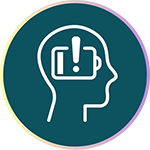
Tiredness
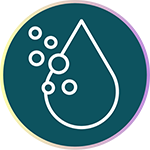
Blood in the urine

Pain in your stomach (abdomen)
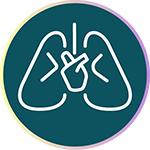
Shortness of breath

Blood clots (thrombosis)

Trouble swallowing

Erectile dysfunction (impotence)
If you experience any of these after stopping treatment, contact your healthcare team. If you have any further questions on the use of this medicine, ask your doctor or pharmacist.1
Warnings and precautions
Signs and symptoms of a serious infection
Iptacopan works by blocking certain proteins in the complement system, a part of your immune system, and protects your red blood cells from being broken down. This way, it can control your PNH symptoms.1,7
Iptacopan may increase your risk of infection caused by encapsulated bacteria, including Neisseria meningitidis (bacteria that cause meningococcal disease, including serious infection of the linings of the brain and of the blood) and Streptococcus pneumoniae (bacteria causing pneumococcal disease, including infection of the lungs, ears and blood).1
You can help yourself against some of the most serious infections by staying on track with a pre-treatment and booster vaccine schedule. You should receive your first vaccine at least 2 weeks before starting treatment with iptacopan.1 See the section below called ‘Why do you need certain vaccines before starting iptacopan?’ for full information on vaccinations.
It’s also important to know the signs and symptoms of these serious infections so that you can get treatment right away if you notice any.
Signs and symptoms of serious infection1
Fever
with or without shivers or chills
with chest pain and cough
with breathlessness/fast breathing
with high heart rate
with a rash (this may be harder to see on brown or black skin)
with a headache
Headache
with or without shivers or chills
with chest pain and cough
Confusion
Body aches with flu-like symptoms
Clammy skin
Eyes sensitive to light
Other signs are short and fast breathing, loss of appetite, neck pain or stiffness, and sensitivity to bright light. Some people may experience double vision, which makes it hard to focus or concentrate. A skin rash may also appear.18
If you have any of these signs or symptoms, be sure to call your healthcare team right away.1
Monitoring and tracking
One of the most important things you can do to help manage PNH symptoms is to take iptacopan exactly as your healthcare team has prescribed. If you experience any signs and symptoms of haemolysis (the breakdown of red blood cells), contact your healthcare team immediately.
Signs and symptoms of haemolysis may include low levels of haemoglobin in your blood (as seen in blood tests), tiredness, blood in the urine, pain in the stomach (abdomen), shortness of breath, trouble swallowing, erectile dysfunction (impotence) or blood clots (thrombosis).1
You may experience haemolysis if you stop taking iptacopan. This can lead to anaemia and other complications. If you’re thinking about stopping for any reason, be sure to talk to your healthcare team first.1
It’s also vital that you undergo tests that your healthcare team organises to check if your PNH is under control.19
Treatment tracking
There are tools you can use to help make it easier to track your results over time. For example, some people use smartphone apps. This can help you to have your tracker right at your fingertips, and you can bring it with you for your appointments with your healthcare team.
When you were prescribed iptacopan, you will have received a Patient Starter Kit full of useful resources and information. This can be similarly helpful when discussing your symptoms during your healthcare appointments.
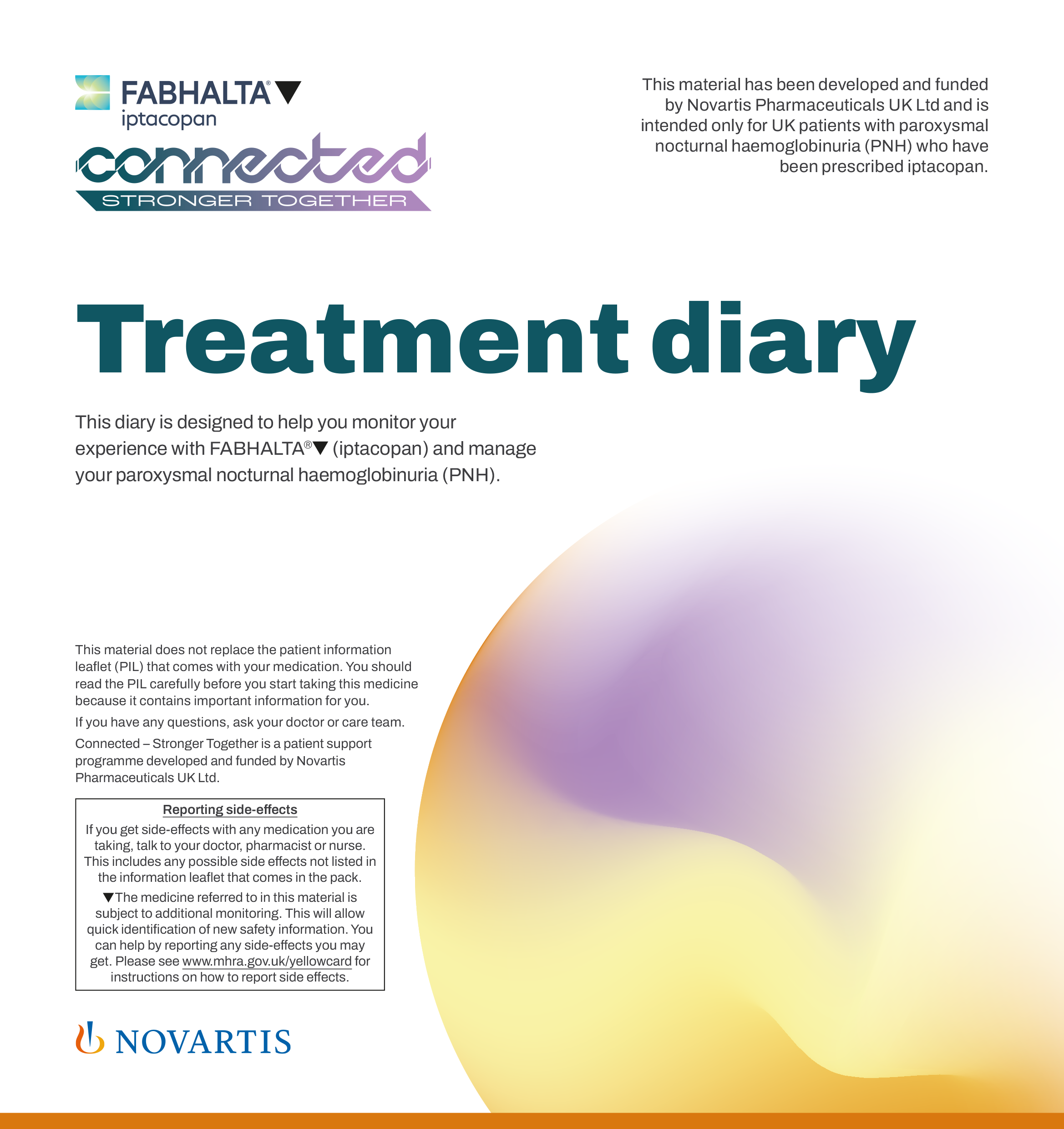
Treatment diary
Why do you need certain vaccines before starting iptacopan?
Vaccinations to have before starting iptacopan
Iptacopan may increase your risk of infection caused by encapsulated bacteria, including Neisseria meningitidis (bacteria that cause meningococcal disease, including serious infection of the linings of the brain and of the blood) and Streptococcus pneumoniae (bacteria causing pneumococcal disease, including infection of the lungs, ears and blood).1
Talk to your doctor before you start iptacopan to be sure that you receive vaccination against Neisseria meningitidis and Streptococcus pneumoniae. You may also receive vaccination against Haemophilus influenzae type B. Even if you have had these vaccinations in the past, you might still need to be revaccinated before starting iptacopan.1
These vaccinations should be given at least 2 weeks before starting iptacopan. If this is not possible, you will be vaccinated as soon as possible after you start iptacopan and your doctor will prescribe antibiotics for you to use until 2 weeks after you have been vaccinated to reduce the risk of infection.1 You should be aware that vaccination reduces the risk of serious infections but may not prevent all serious infections. You should be closely monitored by your doctor for symptoms of infection.1
When you follow the vaccination and booster schedule, the vaccines reduce the chance of you getting a serious infection, but it doesn’t completely take away the risk. While you’re on iptacopan you may still get serious, life-threatening bacterial infections. These include meningococcal infection (or meningitis), pneumonia, and Haemophilus influenzae type B (or Hib). It’s important that you’re aware of the early signs of a serious infection, so that you can get treatment as soon as possible.1
As well as being vaccinated to reduce the risk of serious infections while taking iptacopan, it’s important that you practice healthy hygiene in these ways:21
If you’ve got any questions or concerns, contact your healthcare team.
Getting the most out of your treatment
Getting into a routine
Medicines work best when they are taken correctly. Your healthcare team may have explained that it’s especially important for people with PNH to make sure they take their medication exactly as prescribed. This keeps the right amount of medicine in your body at all times to prevent serious health consequences, including haemolysis, anaemia, chronic kidney disease, and blood clots in your blood vessels (thrombosis).
Take one iptacopan capsule with or without food twice daily, with a glass of water.1
Learn more about how to take iptacopan
Staying on track
Starting a new treatment means adopting a new routine. It’s important to build healthy habits into your daily routine that can help you manage your treatment. You could try the following tips to help you remember to take your iptacopan as prescribed, and to make it part of your everyday routine.22,23
Make taking your medication part of a routine that already exists. For example, you’re already in the habit of brushing your teeth in the morning when you wake up and at night before you go to bed. You can add taking iptacopan to that routine and it will become a daily habit too. This is called ‘habit stacking’22
Restructure your environment. This means changing around your physical environment to change your behaviour. For example, put your blister pack in a more obvious place so you remember it.24
Take iptacopan at the same time each day. The benefit of taking your medicine around the same time of day every day is that your body reaches a ‘steady state’. This means that the amount of drug going into your body – or being absorbed – is the same as the amount of drug going out – or being excreted. This means that there is a steady amount of the medicine in your body1,25
Rehearse the act of taking the medication in your mind. This is a technique known as ‘visualisation’. Closing your eyes can help you see all the steps in your mind. At the same time, answer the following questions to yourself:26,27
Where are you? Maybe you’re in your bathroom or kitchen, getting ready to take your medicine at the start and end of your day
What do you see? Maybe you’re looking at yourself in the mirror right before you take your medicine. Are you looking confident? Are you smiling at yourself?
What do you hear? Is it the sound of your coffee brewing first thing in the morning? Your favourite music that you like to listen to last thing at night?
What do you feel? Maybe you’re feeling proud that you can do this. Or empowered, knowing that you’re doing something each day to help manage your condition
Get help from a member of your support network – a ‘buddy’– to support you by asking them to call or text you each morning and evening as a reminder to take iptacopan. You don’t have to do this all alone23
Sign up to the Stronger – Connected Together Support Programme to receive daily text messages that remind you to take iptacopan
Set an alarm on your phone to remind you each morning and evening to take your medicine
Staying motivated
Sticking with a routine is important because it can help you take the right amount of your medicine at the right time, in the right way.28 Having to do this every single day can sometimes become exhausting, and wishing for a break from PNH is very normal.
You can help yourself stay motivated by remembering one key fact: why you’re doing it.
Many people are motivated to stay on track with iptacopan so they can better manage their PNH and reduce the chance of serious health consequences.28
By doing that, you will be better able to control your symptoms, which can help you feel better and allow you to do the things you want to accomplish.28 Another thing you can do is imagine your future. Managing PNH symptoms can mean more energy to do the hobbies and other things you want to do.
There are days when it’s harder to stay motivated than other days. At those moments it’s helpful to stop and look at how far you’ve come. Make yourself a ‘rewards jar’. When you do something positive, for example take your medication twice a day every day for a set period of time, put a coin in your rewards jar. This can be a visual reminder of how far you’ve come, and what you’re doing to live well.
Preparing for disruptions in routine, such as travel
You’ll need to take iptacopan twice every day, no matter where you are or what else is happening in your life. There may be times when your typical daily schedule is disrupted, or your routine may change if you travel.
Here are some tips to help you remember to take your medicine even if your routine changes.
Tell your healthcare team that you’ll be travelling, and make sure you have a prescription to take with you in case you need it
When travelling, be sure to take enough of your medicine with you, for example a few days’ extra, just in case something happens and you end up being away longer than you had planned28
If you travel by plane, pack your medicine in your carry-on bag and keep it in its original packaging, so that you still have it with you if your luggage is lost28
Be aware of time changes when you travel, as you may be used to taking iptacopan at certain times
Create and share your travel itinerary with others, so they can remind you to take your medicine each day
Try to mimic any routines you have at home, like putting out your medicine somewhere where you can see it
Keeping up with refills
It’s important that you remember to refill your prescription in time so you don’t find yourself without your medicine for even a day. It also helps if you refill your prescription a few days before you run out, to be safe.
You can also note refill dates on a calendar and ask a member of your support network to remind you when your refills are due.
Working with your healthcare team
It’s very important to maintain a good relationship with your healthcare team. In particular, let them know how you’re feeling. PNH is a lifelong condition. There are times when you’ll feel better and be able to do more, and there are times when your symptoms will bother you and hold you back from doing things. Your healthcare team isn’t able to help you if they don’t know what you’re experiencing.29
How to talk with your healthcare team
Here are some tips on how to talk to your healthcare team:29
Keep track of your symptoms. There may be weeks or even months between your healthcare team visits, so tracking your symptoms in a journal or other resource can help you remember what you want to tell your healthcare team. The Treatment diary in your Patient Starter Kit will help you to record your symptoms
Be honest and open with your healthcare team about what you’re experiencing, so that you and your healthcare team can identify any patterns that may make your symptoms worse or better over time
Speak to your healthcare team about how you feel. PNH affects you not only physically, but also emotionally and socially. Your healthcare team relies on you to speak about how PNH affects all areas of your life, including any emotional and social challenges. This can help your healthcare team make informed decisions on how to address your needs
There is nothing to be ashamed of or embarrassed about. Keep in mind that your healthcare team has likely heard it all before and will not judge you. Your healthcare team wants to know how you’re doing in all aspects of your life. The more honest you are, the more your healthcare team can help
Some of the things you can share with your healthcare team to help them understand your experience with PNH include your ability to be active, how well you’re able to manage symptoms, your response to pain, your emotional mood, and your social connections
Talking with your healthcare team and making the most of the time you have during the appointment is not always easy to do. There are things you can do to help you feel more comfortable with this:29
Make a list of your questions or concerns before the appointment so you don’t forget anything you want to discuss, and list the questions in order of priority
Ask for definitions and explanations of anything you don’t understand
Have goals and expectations for the visit and share them with your healthcare team. What do you want to walk away knowing or doing?
If you have any doubts or worries about your treatment, ask questions
Listen carefully and take notes or ask for written instructions
Bring a member of your support network with you to help with the discussion
Preparing for healthcare team appointments
Write down in advance what issues you would like to discuss with your healthcare team, and maybe rehearse your conversations.29 When writing down your topics you could break them down in a similar way to this example:
Identify your what: ‘My memory gets a little foggy sometimes’
Specify your when: ‘This happens to me mostly in the late afternoon’
Share your where: ‘It happens at work, making it hard for me to concentrate’
Ask your healthcare team why and how: ‘Can you please explain why this may be happening and how we can improve it?’
One way to prepare for healthcare team visits is to write out a list of your questions. This will help you ensure that you talk about what is important to you.
You could run through the following steps:29
Make a list of what you want to discuss. It can be about treatment, emotions you’ve been feeling, or the results of a blood test. It’s your list, so you decide what goes on it.
Prioritise the list. Put the most important topics at the top to help ensure they are addressed in case you run out of time or forget.
Email the list. If possible, email the list to your healthcare team before the day of your appointment, so that they’re aware of what you want to discuss.
Bring the list with you. This way, you or a member of your support network, can write down what the healthcare team says during the appointment, so you don’t have to rely on memory.
Download the Appointment planner for more examples of questions you may wish to ask:
Why did you prescribe iptacopan?
What goals are we hoping to achieve with this treatment?
What do I need to know about taking iptacopan?
What are the possible side effects?
What monitoring tests do I need?
How often is monitoring necessary?
How can I find additional resources and support?
Communicating between visits
It’s important to stay connected with your healthcare team between office visits, as questions or concerns may come up at any time. In addition to reaching out with these, why not also reach out to share successes? Maybe your fatigue lessened and you were able to return to a hobby you once enjoyed. Your healthcare team would love to hear about that too.
Advances in technology have made it easier to communicate with your healthcare team outside of office visits. Find out if your healthcare team’s office uses video conferencing, video chat, texts, or email so you can contact them. Don’t be shy about asking how best to reach a member of your healthcare team when you need them.
Caregiver information
The person you care for has been prescribed FABHALTA®, also known as iptacopan, to prevent haemolysis and control their PNH symptoms.
As their caregiver, you’ll feel like supporting them, giving practical advice, and helping them stay motivated to manage their treatment. At the same time you’ll also look out for any changes in their symptoms or signs of infection, to check that their condition isn’t worsening.
As a caregiver, looking after someone with a chronic illness can affect your emotions and overall well-being. While it’s important that you provide care and support for them, you also need to take steps to protect your own physical and emotional health. If you’re not taking care of yourself, it’ll be very difficult for you to look after someone with PNH. Things you can do for your own self-care include:
Doing something that you enjoy at least once a week
Ensuring that you get regular sleep
Taking regular walks and trying to have some form of movement as part of your daily or weekly routine
As a caregiver, you sometimes need support too. Here are a few ways to get it:
Get help from others. Being a caregiver doesn’t mean you have to do it all. Everyone can benefit from support at certain times
Share experiences with others. It’s a great way to express your feelings, listen to others, and learn from other caregivers
Join a local support group. Connecting with a support group can help you to feel less alone, as you can share experiences with people in the same situation as you
Be an advocate for the person you care for
You can offer to attend appointments with the person you care for. This is a great way to offer support and be an active participant in the appointment by speaking up and asking questions when they speak to their healthcare team.
Remember at times, the person you care for may want to be alone. Try not to take this personally. Part of staying close is giving them space if they need it.
Here are a few suggestions on how you can advocate for the person you care for:

Bring copies of reports and test results to each appointment

Help make sure their questions are asked and answered

Ask how you can support them physically and emotionally
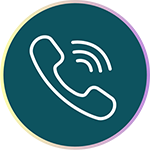
If you can’t attend the visit in person, ask if you can join via video or phone call

Take notes during appointments so they can listen more closely while you’re writing. You can review the notes together after the appointment

If the healthcare team writes a prescription, make sure you can read the drug name and dosage. Ask the healthcare team what the medication is for, if there are any treatment side effects, and how to manage them
References
FABHALTA® Package Leaflet – Information for the patient.
MSD Manual Consumer Version. Drug Administration. Available at: https://www.msdmanuals.com/home/drugs/administration-and-kinetics-of-drugs/drug-administration#. [Accessed November 2024].
Risitano AM & Peffault de Latour R. Br J Haematol 2022;196(2):288–303.
Bardhan M, et al. Physiology, Complement Cascade. StatPearls. 2023. Available at: https://www.ncbi.nlm.nih.gov/books/NBK551511/. [Accessed November 2024].
Dingli D, et al. Ann Hematol 2022;101(2):251–263.
Fishman J, et al. Blood 2023;142(Suppl 1):5637.
Risitano AM, et al. EHA 2023, 8–11 June; Frankfurt, Germany. Oral S182.
Peffault de Latour R, et al. Blood 2022;140(S2):LBA-2.
Risitano AM, et al. HemaSphere 2023;7(S3):189–190.
Ministry of Health NZ. Health New Zealand. Available at: https://info.health.nz/conditions-treatments/brain-and-nerves/headache/. [Accessed November 2024].
Mayo Clinic. Headaches. Available at: https://www.mayoclinic.org/symptoms/headache/basics/definition/sym-20050800. [Accessed November 2024].
Cornell University. Diarrhea. Available at: https://health.cornell.edu/sites/health/files/pdf-library/diarrhea-self-care.pdf. [Accessed November 2024].
Coping with nausea and sickness. University Hospitals Sussex NHS Foundation Trust. https://www.uhsussex.nhs.uk/wp-content/uploads/2023/03/Coping-with-Nausea-and-Sickness.pdf. [Accessed November 2024].
Feeling sick (nausea) – NHS. Available at: https://www.nhs.uk/conditions/feeling-sick-nausea/. [Accessed November 2024].
Mayo Clinic. Arthritis. Available at: https://www.mayoclinic.org/diseases-conditions/arthritis/in-depth/arthritis/art-20046440. [Accessed November 2024].
Dizziness – NHS. Available at: https://www.nhs.uk/conditions/dizziness/. [Accessed November 2024].
Lim R, et al. Int J Environ Res Public Health 2021;18:11877.
Kohil A, et al. Arch Virol 2021;166(2):335–345.
PNH Support. Diagnosis. Available at: https://pnhuk.org/what-is-pnh/diagnosis/. [Accessed November 2024].
Panse J, et al. Eur J Haematol 2022;109(4):351–363.
ChildFund Australia. How does hygiene help stop the spread of infectious disease? Available at: https://www.childfund.org.au/stories/how-does-hygiene-stop-spread-of-infectious-disease/. [Accessed November 2024].
American Institute for Cancer Research. What is Habit Stacking and Why is It Important? Available at: https://www.aicr.org/resources/blog/what-is-habit-stacking-and-why-is-it-important/. [Accessed November 2024].
Arlinghaus K, et al. Am J Lifestyle Med 2018;13(2):142–144.
Behavior Institute. Environmental Restructuring. Available at: https://www.besci.org/tactics/environmental-restructuring. [Accessed November 2024].
Wadhwa RR & Cascella M. Steady State Concentration. 2023 Mar 6. In: StatPearls [Internet]. Treasure Island (FL): StatPearls Publishing; 2024 Jan–. PMID: 31985925.
Insel K, et al. J Am Geriatr Soc 2016;64(3):561–568.
Michie S, et al. Ann Behav Med 2013;46(1):81–95.
U.S. Food & Drug Administration. Why You Need to Take Your Medications as Prescribed or Instructed. Available at: https://cms1files.revize.com/waupacacowi/HumanResources/Wellness/OnsiteNurse/HowToTakeMeds.pdf. [Accessed November 2024].
The Johns Hopkins University. Johns Hopkins medicine. Don’t Be Shy: 4 Tips for Talking to Your Doctor. Available at: https://www.besci.org/tactics/environmental-restructuring. [Accessed November 2024].
UK | November 2024 | FA-11228107
Reporting side-effects
If you get side-effects with any medication you are taking, talk to your doctor, pharmacist or nurse. This includes any possible side-effects not listed in the information leaflet that comes in the pack. ▼ The medicine referred to in this material is subject to additional monitoring. This will allow quick identification of new safety information. You can help by reporting any side-effects you may get. Please see www.mhra.gov.uk/yellowcard. for instructions on how to report side-effects.
Reporting side-effects
If you get side-effects with any medication you are taking, talk to your doctor, pharmacist or nurse. This includes any possible side-effects not listed in the information leaflet that comes in the pack. You can report side-effects via the Yellow Card Scheme at www.mhra.gov.uk/yellowcard.
By reporting side-effects you can help provide more information on the safety of your medication.




